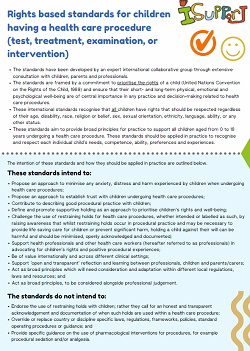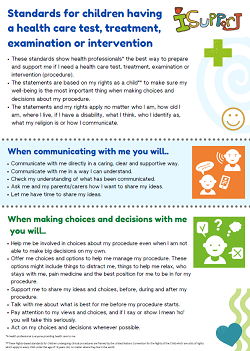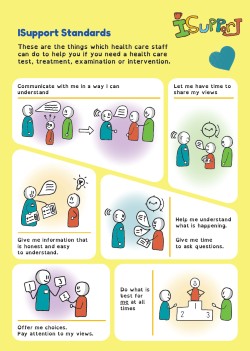Guide to children’s participation in decisions about their health
Providing appropriate information

Any decision-making process should be based on clear information about what is known and what can be expected both in terms of the process itself and the roles of different stakeholders involved. In healthcare, informing children can help them understand their situation, overcome possible fears and anxiety surrounding treatments and generally empower them. Information is also a pre-requisite for meaningful participation and is applicable to all children, independently of their age, background, or health status.
Some children face additional challenges or barriers to being included in decision-making processes, for example, children with a disability, children experiencing mental health problems or a specific health condition, young children, as well as children from vulnerable groups. Therefore, targeted and appropriate support should be provided on a case-by-case basis, to enable the equal exercise of children’s right to participate.
Children should be provided with appropriate and necessary information to enable them to acquire competence for making decisions, to weigh the aim, methods involved, necessity and usefulness of a proposed treatment or intervention against its risks and the discomfort or pain it will cause. Information, communication and education should also enable children and families to play active roles in achieving, protecting and sustaining their own health.
Information should be given about the following aspects:
The specific situation the child is going through, such as information about a new illness, developments of a chronic or other long-term illness or planned hospitalisation experience
Type of treatments and duration, benefits to the child and related risks or possible effects (i.e. what could go wrong, cause problems or make the child worse)
Any alternatives to treatment that are suitable to the child
Any additional needs that may influence the choice of treatment
What might happen if the child does not receive the proposed treatment
Which healthcare professionals they will meet, who they are, and what their role is
Children’s right to be informed throughout the process, to ask questions, express their views and how they will be involved in the decision-making process
Children’s rights concerning their participation in paediatric research and clinical trials, where applicable.
A sensitive issue sometimes is whether and how to talk to children about serious consequences. One may be tempted to avoid mentioning possible fatal outcomes, pain, risks of disability, etc. This requires an assessment of children's maturity in receiving this type of information and their capacity to express their opinion on the subject, as well as a thorough evaluation on the timing and best way to communicate, but it should not be assumed that such serious subjects should be avoided with children. The giving of information actively helps many children to cope with even the most difficult of circumstances, and the absence of information may exacerbate fear and distress. Information to children about serious consequences should always be given carefully and psychological support should be offered to children and their families throughout the information process.
The information provided by healthcare professionals must be sufficiently clear and suitably worded, for example, professionals should avoid the use of medical jargon and include terms that the child can understand. Conversely, if the language used is too childish, the child may feel patronised, so the right balance is important. Sometimes it may be necessary to give information in stages that can be understood and absorbed, and it may be useful to repeat the same information at different times and stages or to complement verbal information with written information where possible and appropriate. In the case of non-native speakers, information should be made provided in a language the child understands (see also examples of linguistic and cultural mediation services in the decision-making phase).
Child-friendly information materials can be used to support the communication and mutual understanding of children, parents and healthcare professionals. It also helps children to reflect on the information they received orally and to identify questions for a follow-up conversation with the healthcare professionals. Child-friendly materials may cover any of the topics listed above and can be developed with a participatory methodology to be better adapted to children’s needs and understanding. Possible formats of child-friendly information material include brochures and leaflets, videos, information accessible through social media, specific websites or applications, games and other. Professionals may also use dolls or toys for “pretending” or simulating.
In any case, it is important that healthcare professionals who interact with the child make sure they coordinate among themselves to avoid giving potentially contradictory information or repeating the same information too many times.
Illustrated EACH charter
ARTICLE 4.1: Children and parents shall have the right to be informed in a manner appropriate to age and understanding
Annotation :
Children, and their parents, are entitled to know what is going to happen to them before undergoing an examination, treatment or other procedure.
Timely and accurate information allows children to retain a sense of control about their healthcare, particularly in hospital.
Information for children
Information given to children should:
- be based on the child’s age and understanding and take into account their level of development;
- be informed by what the child already knows or imagines;
- include honest and simple explanations about their condition and treatment outcomes;
- explain the course of events to come, including what the child may see, smell, hear and feel;
- include appropriately prepared verbal, audiovisual and written information, supported by illustrative models, play or other media presentations.
Staff giving information should appreciate the child’s capacity to comprehend information and express his or her views. Staff should:
- encourage and answer questions, offering comfort when concern or fear is expressed;
- help the child to select and practice strategies for coping;
- make sure that all explanations given have been properly understood.
Preparation will only have a positive effect if the child feels safe. Therefore, information should be given, whenever practicable, in the presence of the parents. Parents need to know what information the child has, so that they can refer to it and repeat it until the child has understood the information correctly.
Information for parents
Information given to parents should:
- be clear and comprehensive;
- consider the parents present situation, especially feelings of fear, sorrow, guilt, anxiety or stress regarding their child’s condition.
Staff giving the information should:
- encourage questions;
- introduce parents to a ‘named person’ whom they can contact whenever they are in need of information;
- satisfy the need for more information by directing parents to additional sources and support groups;
- provide parents with unrestricted access to printed or digital documentation regarding the illness of their child;
- not use the sick child or a sibling as an interpreter for the parents.
Information for children and parents
Information to meet the needs of both the child and parents should:
- be provided continuously during the whole period of care;
- include information regarding care after discharge;
- be provided in a stress free, secure and private environment without pressure of time;
- be given by experienced staff trained and competent to communicate with children and parents in a way which can be readily understood;
- be given, preferably, in the family’s language, with the assistance of a translator if required;
- be repeated as often as necessary to facilitate understanding, checking to ensure that the information has been properly understood by both the child and the parents.
Children have the right to express and have their views taken into consideration. Providing they have sufficient competence to understand the matter, they may veto their parents’ access to their health information, depending on the stipulations of national laws. In such cases staff are required to proceed with the utmost care to evaluate the situation properly. Protection, counseling and support should be given to the child. Hospital staff should ensure that necessary counselling and support are also given to the parents who may be in need of psychological and social help and advice at this time.
Article 5.1: Children and parents have the right to informed participation in all decisions involving their healthcare.
Annotation:
Participation in decision making requires advance information about all measures that need to be taken.
The right of children to participate in their healthcare requires that staff members:
- create an environment based on trust;
- have the capacity to listen;
- share information and give sound guidance;
- respect the right of children to express their view in all matters affecting them;
- give due weight to their opinion in accordance with their competence;
- render a culturally appropriate interpretation of the child’s view;
- accept that children have the right to not express an opinion or to express their views through their parents.
Communication and interaction with others, in particular with parents, starts at birth. As parents know their children best, their observations relating to their child’s expression of stress, discomfort or pain have to be taken seriously. Additionally:
- children may express their views through play, art and other activities;
- staff members must be attentive to the body language used by children when expressing their views;
- excluding children from information may increase their fear;
- staff should respect and take into account signals or nonverbal responses from children who are too young or otherwise not able to express themselves verbally.
The rights of the children and parents to informed consent requires that staff members:
- respect the child’s and the parents’ ability and competence;
- provide adequate and timely information to the child and the parents regarding their child’s health condition, the purpose and value of treatment, the process and the risks;
- offer adequate, reliable information on alternative forms of treatment;
- advise and support the child and the parents to evaluate the proposed course of action;
- acknowledge and take seriously the child’s and parents’ knowledge and experience relating to the their child’s general health condition or present condition.
Children have the right to express their views and may disagree with their parents. Providing they are mature enough to make decisions in their own best interests, staff should respect the child’s opinion, depending on the stipulations of national laws. Staff are required to proceed with the utmost care to properly evaluate the situation. Hospital staff should also ensure that the necessary counselling and support is given to the parents.
National Healthcare Charter for Children - Ireland
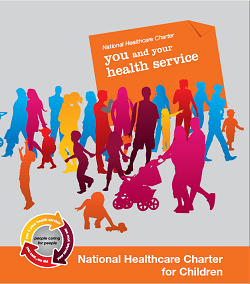
Communications and information
Every child has the right to information, in a form that they can understand. Every child can expect open and appropriate
communication throughout their care.
Children have the right to information that they can understand about their health and healthcare. Information for children should take into account the child’s age and level of development, and;
- appreciate their capacity to understand information and express their views;
- be conveyed using language that is accessible to the child or young person with appropriate verbal, audio-visual and/or written information, supported by illustrative aids, models, play or other media presentations;
- whenever practicable and appropriate, involve parents in the communication process.
WHAT THIS MEANS FOR YOU
Information provided to you about your healthcare needs should:
- be provided continuously throughout your journey through healthcare services;
- take account of your evolving capacity to understand, respond to and engage with the information received;
- include information regarding care after discharge;
- be provided in a safe, secure and private environment without pressure of time;
- be communicated in different ways, using different methods where necessary to facilitate understanding;
- be checked by the staff member to ensure that the information given has been correctly understood by both you and your parent(s);
- provide your parents with access to written or pictorial documentation regarding your illness.
It is crucial that healthcare workers talk directly to you as well as to your family, even if you don’t seem to understand. Healthcare workers and families should be as open as possible with you about your health and healthcare. You are entitled to know what is going to happen to you before a procedure occurs and to be given honest information about your condition and treatment outcomes, and to be helped to select and practice strategies for coping.
COMMUNICATION AND INFORMATION IN RELATION TO YOUR CARE:
What this means for children and young people. Every child can expect open and appropriate communication throughout their care:
- about your health and what the proposed treatment or care aims to do especially when plans change or if something goes wrong;
- concerning the results of any proposed treatment and medication, including the possible risks and alternatives;
- regarding the type of continuing healthcare or therapy that you may need, including medication, continuing care in hospital, timely and appropriate, referrals, convalescence or rehabilitation;
- regarding discharge arrangements and follow-up support in the community.
You should be given:
- the opportunity to ask questions and receive answers that you can understand;
- be supported to ask questions and to make the most of consultations;
- benefit from interpretative services where possible. A child or a sibling should not be used as an interpreter for the parents.
WHAT YOU CAN DO TO HELP
Children together with the support of their parents can promote improved communication:
- If there is something that you do not understand about your condition or treatment, let your healthcare worker/team know. Ask your healthcare worker to explain it better, to draw a picture, or explain it in a way that you will understand. Never be afraid to ask.
- Together with their parents, children can provide information about their medical history, current treatment, medication and alternative therapies. It may be helpful for you to carry a healthcare record with you including information about vaccinations etc.
National Healthcare Charter for Children (page 15 and 16)
Charter on Children’s Rights in Primary Healthcare - Portugal
Charter of the Rights of the Child - Poland
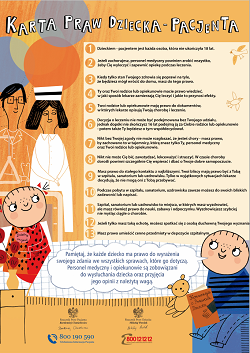
(non-official translation)
CHILDREN'S RIGHTS CHARTER - PATIENT
- 1. A child is a person under the age of 18.
- 2. If you become ill, medical staff must do everything possible to treat you and provide care during your treatment.
- 3. When your health improves enough for you to go home, you have the right to do so.
- 4. You and your parents or carers have the right to know how the doctors intend to treat you and what the effects will be.
- 5. Your parents or carers have the right to obtain the documents in which doctors describe your illness and treatment.
- 6. Decisions about treatment cannot be taken without your participation; however, up to the age of 16, your parents or carers will make the decision for you; after that, you will also be a co-decision-maker.
- 7. Without your permission, no one has the right to spread the news that you are ill; you have the right to keep it a secret known only to you, the medical staff and your parents or carers.
- 8. No one has the right to hit, embarrass, belittle or intimidate you. During your illness, adults must give you special support and look after your well-being.
- 9. You have the right to be in constant contact with your loved ones. They have the right to be with you in a hospital, sanatorium or thermal station. Only in exceptional circumstances will doctors decide that your loved ones cannot be with you.
- 10. While you're in a hospital, sanatorium or thermal station, you can always call or write to your loved ones.
- 11. A hospital, sanatorium or spa is a place where you are supposed to recover, but you also have the right to study, play and rest. You'll recover faster if you don't constantly think about your illness.
- 12. If you wish, you can meet a member of the clergy of your denomination.
- 13. You have the right to place valuables in the hospital depot.
Remember that every child has the right to express his or her opinion on all matters that concern him or her. The medical staff and those caring for you are obliged to listen to you and take your opinion seriously.
iSupport - Rights-based standards for children having tests, treatments, examinations and interventions
iSupport is an international group of health professionals, academics, young people, parents, child rights specialists, psychologists and youth workers who are all passionate about the health and wellbeing of children, especially when they interact with healthcare services. The group has developed and promotes a set of standards that aim to improve the care that all children receive when they have tests, treatments, examinations and interventions. The standards aim to ensure that the short and long-term physical, emotional and psychological wellbeing of children and young people are of central importance in any decision-making for procedures or procedural practice. The standards are a set of documents which outline what good procedural practice looks like.
The Standards, which were developed in 2022, exist in several versions: Standards for professionals, Standards for children and parents, as well as an illustrated version. The team also developed a Prep Sheet to help children get ready for an intervention, and a series of case studies illustrating the application of standards.
Children's rights, Munich Children's Hospital - Germany
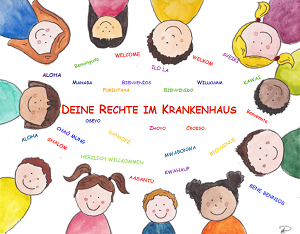
What are children’s rights? How do we implement children’s rights in our clinic? Child Life specialists / Children’s Council / “Sick Children Have Rights” Initiative / Child Health Summit.
It includes other child-friendly material such as a video and a brochure.
Vidéo Children right's (in German)
Brochure (in German)
Kuba and Buba in hospital - almost everything about children's rights: a guide to patient children's rights in book form - Poland
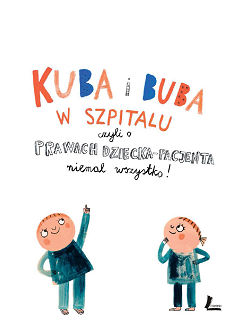
The illustrated story of Kuba and Buba at the hospital teaches children “almost everything about children's rights”.
Kuba and Buba in hospital (in Polish)
Consent to medical research - Switzerland
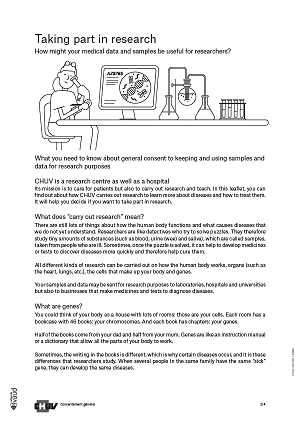
Leaflet Taking part in Research (available in different languages)
Video (in French only) Le consentement général pour les enfants et les adolescent-e-s - Consentement général pour la recherche - CHUV
"What is consent and why am I being asked for it?" - United kingdom
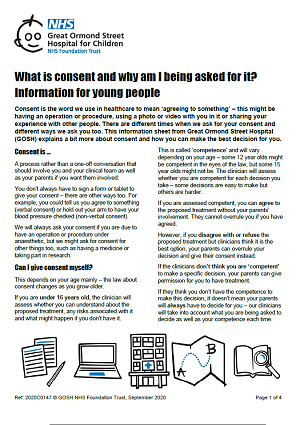
Likewise, the Great Osmond Street Hospital for Children, has produced useful information sheets that explain to children the notion of consent, according to UK legislation, in a manner that is detailed yet accessible.
Read the information sheet (in English)
Great Osmond Street Hospital for Children
My Clinical Trial Center – Serious game

The game is informative, as game-players learn about clinical trials, study protocols, informed consent and assent, phases and procedures of clinical trials, data collection, and pharmacovigilance.
The application was developed with a participatory methodology by members of the TEDDY KIDS network (KIDS Bari and Albania young) and received approval of the International Children's Advisory Network (iCAN).
The game can be downloaded in Play Store and Apple Store. It is currently available in English.
The development of eHealth technology - Sweden
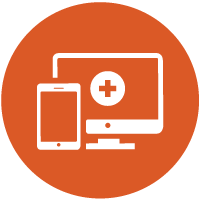
The eHealth solution is now being evaluated in an implementation study at Skåne University Hospital. Children and parents in several specialties use the eHealth solution during periods at home with residual care needs (self-care). Evaluation takes place with the help of digital questionnaires for children and parents as well as via interviews with family members and professional caregivers with a focus on children's participation in care, as well as family members' satisfaction with care and perceived usefulness of the eHealth solution. Data collection is planned to continue during 2023.
The project is part of a broader research programme on eChildhealth funded by FORTE which started in 2018 and is on-going until 2025, with the aim to develop safe and satisfactory child-centred care with the support of e-health. It includes projects in different countries including Sweden, Denmark, and Ethiopia. The focus is on complex, long-term, and costly challenges in paediatric care.
In Sweden, the programme applies to surgery for children born with malformations of the gastrointestinal tract and/or with heart defects, children born prematurely, and children with cancer. In Denmark, it investigates how a mobile application can be used as an aid for the early identification of cerebral palsy in children and how e-health can be used as a tool for intravenous treatment at home for children and young people with acute or long-term illnesses. Ethiopia it is investigating whether reminders sent via text message are an effective strategy to increase adherence to treatment for young people living with HIV.
The end-users (the parents, or the children/adolescents, as well as the professional caregivers) participate throughout the research process.
Providing continuous and comprehensive education to children with diabetes and their carers - Slovenia
The Division of Paediatrics of the University Medical Centre Ljubljana provides comprehensive education to children with diabetes and their parents in order to improve decision-making. Children and parents receive an initial course on health education course. This is followed by further courses during which technological devices (online tools) are introduced.
The centre also organises a yearly rehabilitation retreat, with the Association for children with metabolic disorders.
Each year, a training is organised for educators, teachers and sports trainers who care for children with diabetes. To further improve the care for diabetes and the involvement of patients and parents, the team has also produced several publications covering different aspects of diabetes management (at school, in sports, regarding nutrition...). There is also a website dealing with patient's rights in diabetes care.
Furthermore, during the coronavirus pandemic disease 2019 (COVID-19) the vast majority of appointments for individuals with type 1 diabetes were successfully transitioned online.
Learn more here: https://www.sladkorcki.si/o-sladkorni-bolezni/pravice-otrok-s-sb/ (in Slovenian)
https://vestnik.szd.si/index.php/ZdravVest/article/view/3104 (in English)



